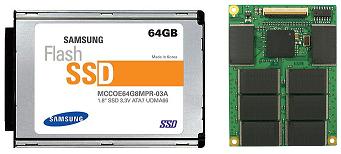The SSD failure debate


SSD is defined as "A disk drive that uses memory chips instead of rotating platters for data storage."
By now you should be able to recite the benefits of SSD by rote: lighter, longer MTBF, more shock resistant, lower operating temperature, faster boot times, yadda, yadda.
In a previous post I posited that SSD may be overhyped because it's not really that fast but is super expensive. While random "disk" access is pretty fast, initial benchmarks show that SSD boot times and sequential disk access are nothing special.
The other big knock on SSD technology is its finite lifespan. People in the know claim that SSDs can start to fail after 100,000 writes to every single cell in the chip, which is almost virtually impossible.
Steve Gibson addressed the SSD lifespan issue on Security Now podcast #122 (transcript). Gibson also responded to a commenter on The Apple Core that wrote to his company to ask why he couldn't use his Spinrite hard disk repair software on a thumb drive.
...the other thing that happens is, if you write to (non-volatile, solid state memory) over and over and over, they die. So they don't die fast. It's like on the order of 10 to the 5 write cycles, so like 100,000 write cycles. But not infinite. Hard drives are infinite. That is, it doesn't hurt them in any way to change the data on them. It actually hurts non-volatile memory to change its data. So in order to mitigate the damage, non-volatile RAM has a technology that spreads the actual writing around the surface of the RAM. So that even if you are reading and writing the same area, that is, the same address of the RAM over and over and over, it's actually occurring in a distributed fashion across different physical areas of the RAM. They do that in order to spread out the damage caused by writing to it.
But naturally the manufacturer says that it's not the case...
Samsung’s Michael Yang defends flash reliability in solid-state drives claiming that SSD's are virtually impossible to wear out. A flash device rated at 100,000 write cycles can write 100,000 times "to every single (memory) cell within the device." In other words, the device doesn't write to the same cell over and over again but spreads out the writes over many different cells. This is achieved through "wear leveling" by the SSD's controller.
Yang said a pattern could be perpetually repeated in which a 64GB SSD is completely filled with data, erased, filled again, then erased again every hour of every day for years, and the user still wouldn't reach the theoretical write limit. He added that if a failure ever does occur, it will not occur in the flash chip itself but in the controller.
Can SSDs be any worse than HDDs? There are only two types of hard drives, those that are dead and those that are dying. After about three years or so I don't place much faith in any hard drive. They all start to get flakey after three and five years of use.
Prone to failure or not, SSDs are too expensive to be practical for me. If the MacBook Air had an 128MB SSD option for, say $500, I'd be all over it.
[poll id=105]